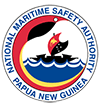Oil Spill Impacts on PNG’s Waters - Papua New Guinea National Maritime Safety Authority
PNG Water means;
- the internal waters;
- the territorial sea;
- the contiguous zone;
- the archipelagic waters; and
- the exclusive economic zone
An initial impact from an oil spill can vary from minimal impact to large scale mortality within a particular biological community. Spilled oil poses serious threats to fresh water and marine environments, affecting surface resources and a wide range of subsurface species that are linked in a complex food chain that includes human food resources.
Spilled oil can harm the environment in several ways, including:
- the physical damages that directly impact wildlife and their habitats (such as coating birds or mammals with a layer of oil)
- the toxicity of the oil itself, which can poison exposed organisms.
- PNG’s waters are vital to the subsistence of its inhabitants and the nation’s economy, with the sea acting as a ‘Free Supermarket’ for coastal community residents in PNG.
The actions of winds, waves, and currents (called weathering) causes spilled oil to break down and become distributed throughout the water.
Oil toxicity is reduced as the oil weathers. An oil spill that reaches a shore quickly will be more toxic to the shore life than if the slick has been weathering at sea for several days before stranding.
The greatest toxic damage is caused by spills of lighter oil such as diesel, particularly when confined in a small area.
The various types of freshwater and marine habitats that exist in nature have different sensitivities to the harmful effects of oil contamination, as well as different abilities to recover.
Recovery times following spills can vary from a few days to decades; depending on the type of environment and the size and type of the spill and conditions at the time. There is no clear-cut relationship between the size of a spill and the extent of the damage caused.
The goal of any shoreline clean-up is to clean only to the extent that will speed up the recovery and use of the area. Any activity has to be carefully measured against allowing natural recovery. In many cases intervention can do more harm than good. Sometimes leaving the oil to breakdown naturally is preferable and more effective.

